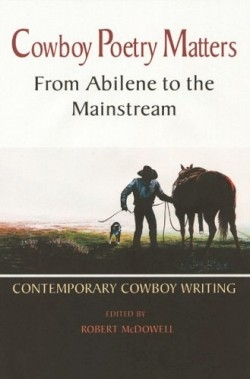Cowboy Poetry Matters
From Abilene to the Mainstream
McDowell titles his collection with a straight face, and bolsters its contention with sobersided essays by Dana Gioia, Paul Zarzyski, Nancy McClelland and Kathy Ogren—but most people who pick up this book will want to let the poems themselves make their case. McDowell peppers a generous selection of poems by real cowboys (Zarzyski, Buck Ramsey, Wallace McCrae) and ranch women (Virginia Bennett, Linda Hussa) with work by horse-loving poets like Linda McCarriston, Maxine Kumin and Liam Rector. The work of the interlopers does stand out: you won’t catch McCrae writing “I proffer up the dire smidgeon,” as Rector does, and the poets who celebrate the cowboy life are mining different territory from what Linda McCarriston plumbs in “Le Coursier de Jeanne d’Arc.” No matter: McDowell is trying to show where Cowboy poetry (which he always capitalizes) intersects poetry’s mainstream.
It may well be more suited to the mainstream than most poetry: frequently rhymed, metrical and hilarious, these poems are easily accessible to readers. They celebrate the working life of the cowboy, specific legendary acts and the landscape of the West; they’re not afraid of appearing sentimental about favorite animals or a dying way of life. Not least, they celebrate each other and their genre: Wallace McCrae, poking fun at cowboy poetry’s popularity in “Riders’ Block,” writes, “Damn Zarzyski, Michael Logan,/ Who never lack a theme or slogan/ Or inspiration for a rhyme./ What’s their gimmick? Why’s it I’m/ Stuck here rimrocked, thinking zero,/ When I could be a western hero/ On Western Horseman’s poet’s page?/ A sagebrush rhyming cowboy sage./ My powder’s wet. The well is dry./ Calliope has passed me by.”
Zarzyski offers a definition for cowboy poetry—“the ring and ricochet of lingo off the stirrup bone of the middle ear”—and suggests that his mentor, the poet Richard Hugo, “[would] have loved the language of the horseman—reata, latigo, tapadera, concho, hackamore.” At its best, cowboy poetry riffs on the language and lives of individual and common people whose rural working lifestyle provides the subject matter for a rich body of poetic work. This anthology will help some readers new to cowboy poetry find a place for it alongside more mainstream, but perhaps less traditional, offerings.
Reviewed by
Janet Holmes
Disclosure: This article is not an endorsement, but a review. The publisher of this book provided free copies of the book to have their book reviewed by a professional reviewer. No fee was paid by the publisher for this review. Foreword Reviews only recommends books that we love. Foreword Magazine, Inc. is disclosing this in accordance with the Federal Trade Commission’s 16 CFR, Part 255.

